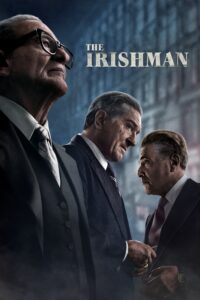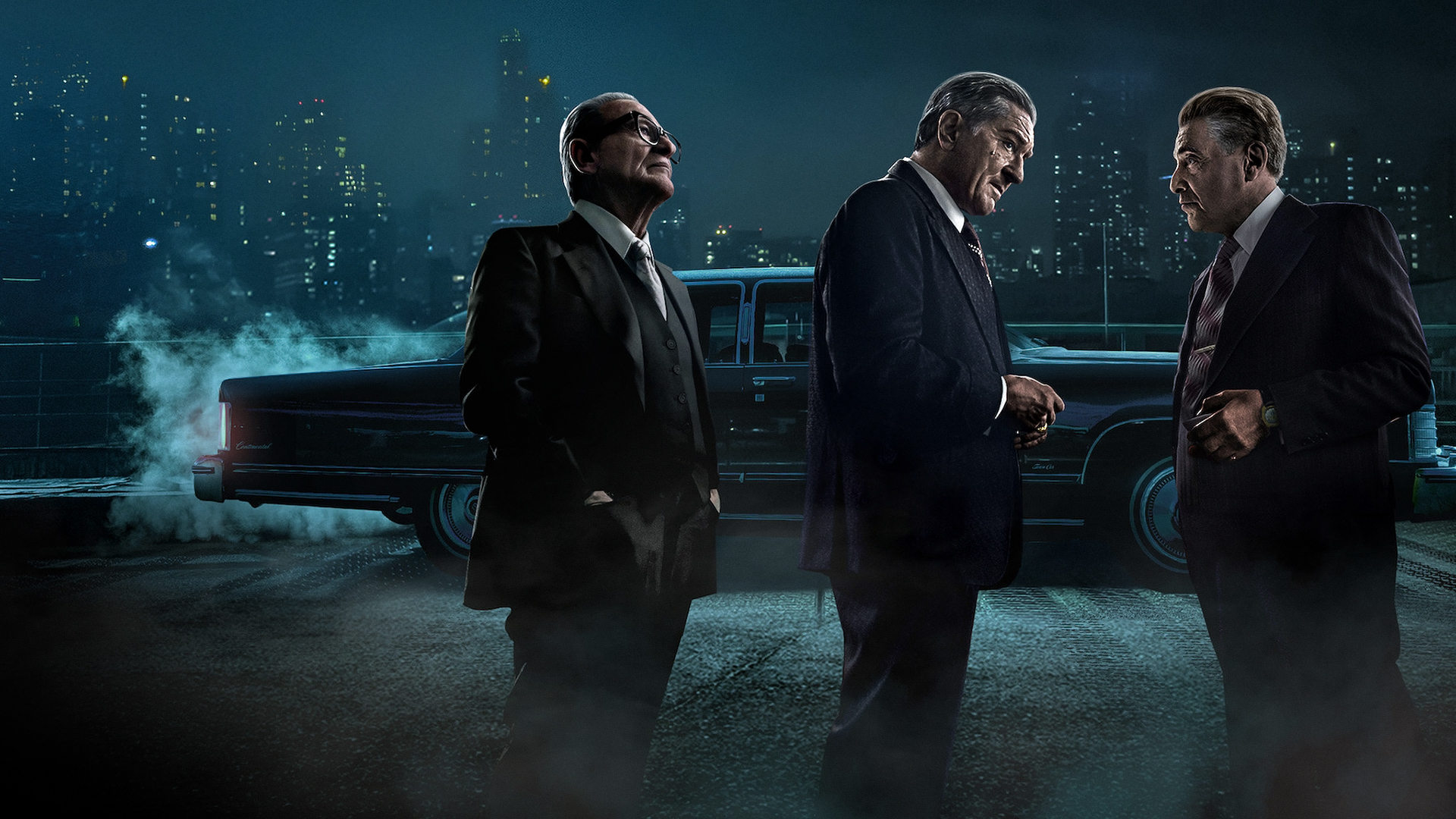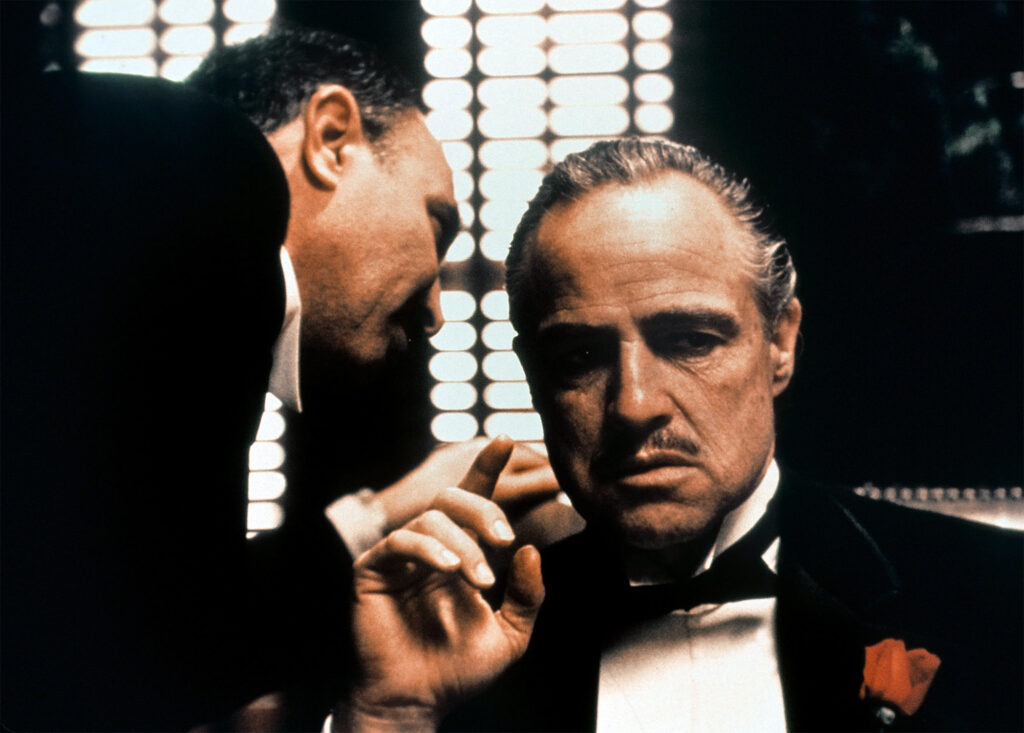Martin Scorsese‘s “The Irishman” is a monumental film that stands as a testament to the director’s enduring genius and his profound grasp of the gangster genre he helped to define. Released in 2019, “The Irishman” spans a sweeping runtime of 3 hours and 29 minutes, an epic duration that allows for an in-depth exploration of its intricate narrative and complex characters.
Based on the book “I Heard You Paint Houses” by Charles Brandt, the film weaves a sprawling narrative centered on Frank Sheeran (Robert De Niro), a World War II veteran turned hitman. The story, spanning several decades, delves into Sheeran’s associations with powerful mob figures like Russell Bufalino (Joe Pesci) and Jimmy Hoffa (Al Pacino). It is a journey through time, charting the rise and fall of these larger-than-life figures, set against the tumultuous backdrop of American history.

The Irishman is a 2019 American epic gangster film directed and produced by Martin Scorsese from a screenplay by Steven Zaillian,
One of the most striking aspects of “The Irishman” is Scorsese’s use of de-aging technology to allow his aging actors to play their characters across different time periods. While this digital wizardry received mixed reactions, it undeniably contributes to the film’s ambitious storytelling. For the most part, the technology works seamlessly, allowing De Niro, Pesci, and Pacino to deliver performances that span decades without the distraction of makeup or different actors stepping in for younger versions of their characters.
Robert De Niro’s portrayal of Frank Sheeran is both subdued and deeply compelling. De Niro brings a quiet intensity to Sheeran, a man whose emotions are buried deep beneath a stoic exterior. Frank’s journey is one of loyalty and betrayal, portrayed with a kind of world-weary resignation that speaks to the cost of a life steeped in violence and moral compromise. De Niro’s nuanced performance captures this internal conflict with a melancholic grace that lingers long after the credits roll.
Joe Pesci, returning from semi-retirement, delivers a masterclass as Russell Bufalino. Gone is the ferocious energy of his earlier characters in Scorsese films such as “Goodfellas.” In “The Irishman,” Pesci adopts a more restrained, almost serene demeanor that makes Bufalino’s authority and menace all the more chilling. It’s a subtle and powerful performance that serves as a quiet reminder of Pesci’s remarkable talent.
Al Pacino, as the fiery union leader Jimmy Hoffa, injects the film with a frenetic energy that catalyzes much of the narrative’s tension. Pacino’s Hoffa is a man of grand ambitions and volatile emotions, his larger-than-life persona clashing spectacularly with the more subdued pragmatism of his criminal allies. It’s a vivacious performance that provides a necessary counterpoint to the film’s otherwise somber tone.
Scorsese’s direction in “The Irishman” is nothing short of masterful. His penchant for long takes, intricate camera movements, and meticulously crafted scenes is on full display. The film’s pacing is deliberate, allowing for moments of quiet reflection amid the violence and intrigue that characterize the gangster lifestyle. Scorsese’s choice to shoot the film in a style reminiscent of his earlier works lends it a timeless quality, evoking memories of “Goodfellas” and “Casino” while standing firmly on its own merits.
The script by Steven Zaillian is a triumph, adapting the source material into a screenplay that balances historical events with personal drama. Zaillian’s dialogue is sharp and natural, allowing for moments of levity to punctuate the tension. The screenplay’s structure, alternating between different timelines, is a bold narrative choice that, in Scorsese’s capable hands, enhances the storytelling rather than complicating it.
The film’s themes of loyalty, mortality, and the ravages of time resonate deeply. The Irishman is a contemplative meditation on the passage of time and the cumulative weight of one’s actions. It’s a departure from the romanticism often associated with gangster films, presenting its characters not as glamorous antiheroes but as deeply flawed individuals grappling with the consequences of their choices.
“The Irishman” is a magnum opus that reaffirms Martin Scorsese’s status as one of cinema’s greatest auteurs. It is a poignant, elegiac exploration of a life’s work in crime, richly layered and profoundly affecting. While its length may be daunting to some, those willing to embark on this cinematic odyssey will find themselves rewarded with a film of rare depth and resonance. It’s a story of men bound by their decisions, caught in the inexorable march of time, rendered with the kind of artistry that only Scorsese can deliver.



